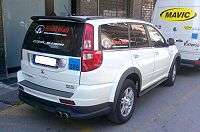Great Wall Haval H3
| Great Wall Haval H3 | |
|---|---|
 | |
| Overview | |
| Manufacturer | Great Wall Motors |
| Also called |
Great Wall Hover Great Wall Hover CUV Great Wall Hover H3 Great Wall Hafu Great Wall X240 (Australia) |
| Production | 2005–present |
| Body and chassis | |
| Class | Compact SUV |
| Body style | 5-door wagon |
| Powertrain | |
| Engine |
2.4 L 4G64 I4 petrol 2.8 L GW2.8TC I4 diesel |
| Dimensions | |
| Wheelbase | 2,700 mm (106.3 in) |
| Length | 4,620 mm (181.9 in) |
| Width | 1,800 mm (70.9 in) |
| Height | 1,710 mm (67.3 in) |
| Curb weight | 1,720 kg (3,792.0 lb) |
The Great Wall Haval H3 (Chinese: 长城哈弗; pinyin: Chángchéng Hāfú), also known as the Great Wall Hover, is a compact sports utility vehicle (SUV) produced by the Chinese manufacturer Great Wall Motors since 2005.
It was the first Chinese car to be exported in large quantities to Western Europe in 2006, with 30,000 units shipped to Italy. Its main advantage over established European, North American and Asian rivals is its low comparative cost. A six-speed automatic concept version called the Great Wall Hover H7 was made and can reach speeds of up to 225 km/h or 140 mph.[1]
In Australia, it was badged as the Great Wall X240[2] until 2011, when the X240 nameplate was used on the Haval H5.
Design and engineering
One of the reasons for the comparatively low retail price of the Great Wall Haval H3 is that it is based heavily on older models by other manufacturers. The entry-level engine is the 4G64 2.4 litre gasoline inline-four supplied by Mitsubishi,[3] the exterior resembles the Isuzu Axiom and the chassis is from a Toyota 4Runner. The Haval H3 has a wheelbase of 2,700 mm (106.3 in) and a wheel track of 1,520 mm (59.8 in). The Haval H3 is a Sports Utility Vehicle, with selectable rear wheel drive or 4-wheel drive (4WD).
-

Rear view
-

2010 Great Wall Haval H3
Engines and transmission
The gasoline-fuelled Great Wall Haval H3 uses the Mitsubishi 4G69[4] Sirius series straight-4 automobile engine. The 4G64 engine was introduced in 1988 in the Mitsubishi Galant and has been used by several other car manufacturers. The 4G64 engine produces 128 hp (95 kW). The diesel version uses a motor built by Great Wall themselves, the GW2.8TC. Both versions have a 5-gear manual transmission. Those models had the name Hover H3 and H5. For the Chinese market Great Wall also offer 2.5 and 2.8 TCI diesel engines with 107 hp (80 kW) and 114 hp (85 kW). These engines both use a modern common rail system from Bosch.
Environmental and safety test
One of the main problems facing exported Chinese cars was European safety and environmental regulations. The Great Wall Haval H3 complies with the Euro-III emissions standard.[5] It was awarded three stars from C-NCAP crash testing.[6] In the Australasian New Car Assessment Program (ANCAP) crash testing undertaken on 24 March 2010, the post-2009 model Haval 3 received a Four Star rating.[7] The Great Wall Haval H3 has not yet been tested by EURO NCAP. With new engines which Great Wall Motor installed in the Haval H3, all models now comply with Euro 4 regulations. In Italy, a version of the Hover called the EcoDual is sold equipped to run on alternatives fuels, being equipped with LPG or CNG capabilities. From 2009 year vehicle have Euro 4 engine which was also installed in Hover 5
Limousine version
| Great Wall Hover Pi | |
|---|---|
 | |
| Overview | |
| Also called | Great Wall Hover π |
| Body and chassis | |
| Class | Limousine CUV |
| Powertrain | |
| Engine | 2.4 L 4G64 I4 petrol |
| Dimensions | |
| Wheelbase | 4,800 mm (189.0 in) |
| Length | 6,720 mm (264.6 in) |
Great Wall also produces a more luxurious, limousine version of the Hover, called the Great Wall Hover Pi[8][9] (Chinese: 长城哈弗派). Its name is also sometimes spelt Hover π. The first Hover Pi was given as a gift to Fidel Castro.[10] The vehicle has so far been the best selling vehicle of its kind (most others originating outside China being stretched by third-party conversion outfits), being exported to Japan, South Korea, France, Italy, Malaysia, Russia, South Africa, and other overseas markets. In 2008, the Hover Pi's length was extended from 6.7 meters to 6.9 meters.[11]
References
- ↑ "Shanghai Show: Great Wall Hover H7 Concept – Carscoop". Carscoop.blogspot.com. 2009-04-20. Retrieved 2009-09-30.
- ↑ Pettendy, Marton; John Mellor (2009-10-15). "Great Wall X240 ready to roll". GoAuto. Retrieved 2009-10-15.
- ↑ "Great Wall Motors X240 SUV Approved For Sale In Australia". The Motor Report. 2009-10-21. Retrieved 2011-01-02.
- ↑ "Hover SUV Engine and Integrated Review and Test". Auto-chinese.com. Retrieved 2010-04-25.
- ↑ "Great Wall Motor Company Limited". Gwm.cn. Archived from the original on 2008-03-12. Retrieved 2008-04-03.
- ↑ "中国新车评价规程(C-NCAP)官方网站". C-ncap.org. Retrieved 2008-04-03.
- ↑ "ANCAP Crash Test - Great Wall Motors X240 2009". Mynrma.com.au. Retrieved 2011-01-02.
- ↑ "Great Wall Hover π". Gwm.com.ro. Retrieved 2008-05-16.
- ↑ "Great Wall Hover π". Gwm.com.cn. Archived from the original on 2008-04-20. Retrieved 2008-05-16.
- ↑ "Great Wall Wingle". Indiacar.net. Retrieved 2009-09-30.
- ↑ "Hover Pi drives Great Wall Motor to limo segment". Gasgoo.com. 2008-08-15. Retrieved 2009-09-30.
External links
| Wikimedia Commons has media related to Great Wall Haval. |
| ||||||||||||||||||||||